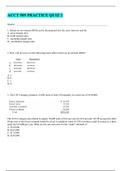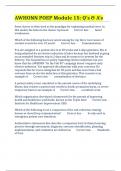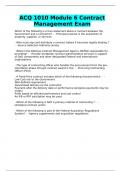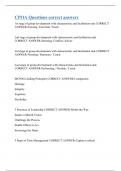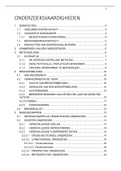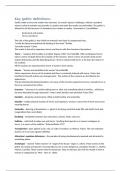Week 1
● Thesis:
○ Single statement
○ Declarative sentence
○ Arguable
○ Bold
● Argument statement:
○ Single statement
○ Declarative sentence
○ In support of thesis
○ Generally requires elaboration and confirmation
● Body argumentative paper:
○ Argument statement
■ Support statements
■ Summary line
○ Argument statement
○ Concessionary statement
■ Rebuttal line
■ Rebuttal support statements
■ Summary line
● Approaches to argumentation:
○ Case study
○ Comparative
○ Perspective-based
○ Analogical
○ Rote argumentation
● Argumentative fallacies:
○ Generalizations
○ Non sequitur statements → do not follow statements
○ Post hoc statements → smth happened before smth else, but it is not very clear
that one was the consequence of the other
○ Ad hominem argument → someone says smth and might be true, but u don’t
know if u can trust them bc …. For ex they were a thief
○ Bandwagon arguments - if everyone says it, it must be true
Week 2
Analyzing and evaluating texts: the elements of the text
● E pluribus unum
○ Lawyers and legal scholars read an reference numerous types of texts:
■ Scholarly articles
■ Research papers
, ■ Jurisprudence
■ Policy memos
■ Format correspondence
■ Statutes
■ Treaties
○ They need to be able to draw these together in coherent and cohesive narrative
● The forest for the trees
○ In order to do so, a writer needs to be able to quickly identify
■ The key elements and message of a particular document
■ The key features and qualities of that document
○ Likewise, the writes needs to see
■ The role the text can play in supporting the goals of the writer’s own text
● The bare bones of it
○ The first step in this process is to identify the key elements of the text
■ What is the topic?
■ What is the key question being raised, the foremost problem being put
forward, or the primary area of investigation being defined?
■ What is the author’s position (in a scholarly or argumentative piece), the
researcher’s basic assumption, hypothesis (in a research paper), or the
policymaker’s proposal/recommendation (in a policy memo or white
paper)
■ What are the key statements in support of the position, hypothesis, etc
■ How are the position and the body of arguments drawn to a synthetic
result (resultant thinking, conclusion)
● In essence
○ You need to look to the introduction for:
■ Topic and background
■ Issue / research question
■ Position / hypothesis
○ You need to look to the body of the paper for:
■ Key arguments (in scholarly argumentative work)
■ Key results and primary points of discussion (in a research paper)
■ Primary motivations and points of analysis (in a policy memo)
○ You need to look to the conclusion for:
■ The resultant thinking
● With this in hand
○ You can better define where the article will fit into your own work
■ Is the thesis in line with your own position?
■ Does the research described support the assumptions made in your
paper?
■ Are the recommendations being made in line with your expectations?
○ You can move to the next step of evaluation the value and validity of the text
■ Do the arguments properly support the thesis being put forward? Does
the evidence confirm the hypothesis being made?
, ■ Can the conclusion drawn be seen as the reasonable and logical product
of what has gone before?
Analyzing and evaluating texts: Clarity, Cohesion, and Context
● Stop thinking in terms of ‘good’ or ‘bad’
○ Clarity
○ Brevity
○ Focus
○ Cohesion
○ Effectiveness
○ Appropriateness
● Clarity: does the author present ideas and support materials in an accessible fashion?
● Brevity: is the style of writing economical or verbose?
● Variety: is there enough variety of language use to ensure engagement and sufficient
use of synonyms to ensure comprehension?
● Focus and cohesion: does the author remain on topic or are there numerous sidebars
and deviations from the main points? Are there clear signals being used to denote the
relationship between elements of the texts and the ideas being put forth in the text? Is it
clear that each section/segment of the text contributes to the greater whole of the text -
do all the elements contribute to the central goal of the text?
● Effectiveness and appropriateness: is the manner in which arguments and evidence are
presented convincing? Does the article convey a sense of relevance and provide a
sense of contribution to the topic being discussed? Is the tone appropriate to the nature
of the topic being discussed?
● It also helps to think in terms of purpose:
○ Who is this text meant for?
○ What is the author;s apparent intention?
○ What is the context of the publication?
Analyzing and evaluating texts: the truth of it all
● Argumentation
○ Thesis
■ Argument statement
■ Argument statement
■ Counter-argument + refutation of counter-argument
■ Argument statement
○ Argument statements can be supported in various ways
■ Through the provision of verifiable data, documented fact and official
records
■ Through the presentation of analogous examples
■ By means of citation of similar assertions by experts
■ Through the provision of the author’s argued inferences
● Weigh the arguments being presented on:
○ Verifiability
○ Authority
○ Acceptability
, ○ Relevance
Lesson:
● The author agrees with the ICJ opinion and believes there are no necessary changes.
● Topic: icj’s opinion on the threat or use of nuclear weapons,
● key q: should there be any changes made to the current nuclear weapon policies?, is
this advisory opinion correct or not?
● author’s position: the author agrees with the ICJ about the fact that there are no
necessary changes that should be made to the current nuclear weapon policies,
● key statements: WHO, UNGA resolutions/request, self-defense, extreme self-defense,
poisoned weapons, customary law, use in some/all circumstances, civilian vs military
targets, unnecessary suffering, ‘policy of deterrence’, belligerent,
● how he came to his conclusion: based on the ICJ opinion
● The author is stating the ICJ’s opinion on the threat or use of nuclear weapons. He
tackles different aspects concerning the question of whether the current nuclear weapon
policies require any necessary changes, or whether they are fine the way they are now.
The author discusses multiple arguments for and against the current policies, such as
self-defense and whether nuclear weapons could be considered lawful in such
situations. However, the author does state that nuclear weapons will always carry certain
risks with it, therefore, it would ‘devastate life on earth’.
Week 3
Deliberation is the process of reaching a decision in a body or organization in which a
majority of support must be achieved.
Negotiation, on the other hand, is about reaching agreement between parties on terms
for settlement of specific issues.
● Deliberation:
○ Deliberation is the means by which positions are determined between groups in
democratically-ruled decision-making bodies as part of the process of reaching
decisions on specific issues.
○ Or
○ It is the means of determining the behaviour of the decision-making body with
respect to external events (public declarations, votes of censure, etc).
● The deliberative speaker:
○ The speaker has three concerns:
■ Putting forward one’s position in a clear and supportable fashion
■ Maintaining a viable working relationship with the other members of the
deliberative body and other parties directly involved in the deliberative
process
■ The needs of the constituency the speaker serves, either directly or
indirectly.
● Thesis:
○ Single statement
○ Declarative sentence
○ Arguable
○ Bold
● Argument statement:
○ Single statement
○ Declarative sentence
○ In support of thesis
○ Generally requires elaboration and confirmation
● Body argumentative paper:
○ Argument statement
■ Support statements
■ Summary line
○ Argument statement
○ Concessionary statement
■ Rebuttal line
■ Rebuttal support statements
■ Summary line
● Approaches to argumentation:
○ Case study
○ Comparative
○ Perspective-based
○ Analogical
○ Rote argumentation
● Argumentative fallacies:
○ Generalizations
○ Non sequitur statements → do not follow statements
○ Post hoc statements → smth happened before smth else, but it is not very clear
that one was the consequence of the other
○ Ad hominem argument → someone says smth and might be true, but u don’t
know if u can trust them bc …. For ex they were a thief
○ Bandwagon arguments - if everyone says it, it must be true
Week 2
Analyzing and evaluating texts: the elements of the text
● E pluribus unum
○ Lawyers and legal scholars read an reference numerous types of texts:
■ Scholarly articles
■ Research papers
, ■ Jurisprudence
■ Policy memos
■ Format correspondence
■ Statutes
■ Treaties
○ They need to be able to draw these together in coherent and cohesive narrative
● The forest for the trees
○ In order to do so, a writer needs to be able to quickly identify
■ The key elements and message of a particular document
■ The key features and qualities of that document
○ Likewise, the writes needs to see
■ The role the text can play in supporting the goals of the writer’s own text
● The bare bones of it
○ The first step in this process is to identify the key elements of the text
■ What is the topic?
■ What is the key question being raised, the foremost problem being put
forward, or the primary area of investigation being defined?
■ What is the author’s position (in a scholarly or argumentative piece), the
researcher’s basic assumption, hypothesis (in a research paper), or the
policymaker’s proposal/recommendation (in a policy memo or white
paper)
■ What are the key statements in support of the position, hypothesis, etc
■ How are the position and the body of arguments drawn to a synthetic
result (resultant thinking, conclusion)
● In essence
○ You need to look to the introduction for:
■ Topic and background
■ Issue / research question
■ Position / hypothesis
○ You need to look to the body of the paper for:
■ Key arguments (in scholarly argumentative work)
■ Key results and primary points of discussion (in a research paper)
■ Primary motivations and points of analysis (in a policy memo)
○ You need to look to the conclusion for:
■ The resultant thinking
● With this in hand
○ You can better define where the article will fit into your own work
■ Is the thesis in line with your own position?
■ Does the research described support the assumptions made in your
paper?
■ Are the recommendations being made in line with your expectations?
○ You can move to the next step of evaluation the value and validity of the text
■ Do the arguments properly support the thesis being put forward? Does
the evidence confirm the hypothesis being made?
, ■ Can the conclusion drawn be seen as the reasonable and logical product
of what has gone before?
Analyzing and evaluating texts: Clarity, Cohesion, and Context
● Stop thinking in terms of ‘good’ or ‘bad’
○ Clarity
○ Brevity
○ Focus
○ Cohesion
○ Effectiveness
○ Appropriateness
● Clarity: does the author present ideas and support materials in an accessible fashion?
● Brevity: is the style of writing economical or verbose?
● Variety: is there enough variety of language use to ensure engagement and sufficient
use of synonyms to ensure comprehension?
● Focus and cohesion: does the author remain on topic or are there numerous sidebars
and deviations from the main points? Are there clear signals being used to denote the
relationship between elements of the texts and the ideas being put forth in the text? Is it
clear that each section/segment of the text contributes to the greater whole of the text -
do all the elements contribute to the central goal of the text?
● Effectiveness and appropriateness: is the manner in which arguments and evidence are
presented convincing? Does the article convey a sense of relevance and provide a
sense of contribution to the topic being discussed? Is the tone appropriate to the nature
of the topic being discussed?
● It also helps to think in terms of purpose:
○ Who is this text meant for?
○ What is the author;s apparent intention?
○ What is the context of the publication?
Analyzing and evaluating texts: the truth of it all
● Argumentation
○ Thesis
■ Argument statement
■ Argument statement
■ Counter-argument + refutation of counter-argument
■ Argument statement
○ Argument statements can be supported in various ways
■ Through the provision of verifiable data, documented fact and official
records
■ Through the presentation of analogous examples
■ By means of citation of similar assertions by experts
■ Through the provision of the author’s argued inferences
● Weigh the arguments being presented on:
○ Verifiability
○ Authority
○ Acceptability
, ○ Relevance
Lesson:
● The author agrees with the ICJ opinion and believes there are no necessary changes.
● Topic: icj’s opinion on the threat or use of nuclear weapons,
● key q: should there be any changes made to the current nuclear weapon policies?, is
this advisory opinion correct or not?
● author’s position: the author agrees with the ICJ about the fact that there are no
necessary changes that should be made to the current nuclear weapon policies,
● key statements: WHO, UNGA resolutions/request, self-defense, extreme self-defense,
poisoned weapons, customary law, use in some/all circumstances, civilian vs military
targets, unnecessary suffering, ‘policy of deterrence’, belligerent,
● how he came to his conclusion: based on the ICJ opinion
● The author is stating the ICJ’s opinion on the threat or use of nuclear weapons. He
tackles different aspects concerning the question of whether the current nuclear weapon
policies require any necessary changes, or whether they are fine the way they are now.
The author discusses multiple arguments for and against the current policies, such as
self-defense and whether nuclear weapons could be considered lawful in such
situations. However, the author does state that nuclear weapons will always carry certain
risks with it, therefore, it would ‘devastate life on earth’.
Week 3
Deliberation is the process of reaching a decision in a body or organization in which a
majority of support must be achieved.
Negotiation, on the other hand, is about reaching agreement between parties on terms
for settlement of specific issues.
● Deliberation:
○ Deliberation is the means by which positions are determined between groups in
democratically-ruled decision-making bodies as part of the process of reaching
decisions on specific issues.
○ Or
○ It is the means of determining the behaviour of the decision-making body with
respect to external events (public declarations, votes of censure, etc).
● The deliberative speaker:
○ The speaker has three concerns:
■ Putting forward one’s position in a clear and supportable fashion
■ Maintaining a viable working relationship with the other members of the
deliberative body and other parties directly involved in the deliberative
process
■ The needs of the constituency the speaker serves, either directly or
indirectly.

